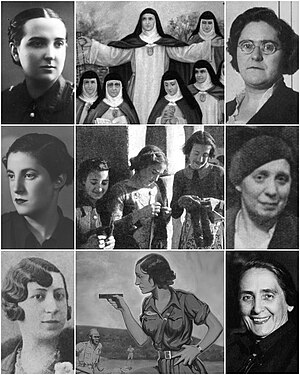| Part of a series on |
| Women in the Spanish Civil War |
|---|
 |
|
|
Women in the Spanish Socialist Workers' Party were few in number, mainly as a result of the Spanish Socialist Workers' Party (Partido Socialista Obrero Español) (PSOE)'s resistance to women's rights. The party had opposed the women's rights movement, seeing it as a bourgeois endeavor that interfered with their ability to work for labor rights. Despite warnings from prominent women about the problems related to this position, they re-affirmed it several times in the period prior to the Dictatorship of Primo de Rivera.
María Cambrils, a socialist women chosen by the government of Primo de Rivera to serve in 1927's Asamblea Nacional Consultiva, was the most important women's voice of her party in this period. The PSOE engaged important feminists of the day but refused to commit to women's rights and suffrage. The PSOE nominally supported women's suffrage when it was discussed in 1927, after Primo de Rivera gave women the right to vote via Royal Decree.
The Second Republic came into being in 1931, with one of three prominent women, Margarita Nelken y Mansbergen, voted into the inaugural Congreso de Diputados as a representative of the PSOE. Clara Campoamor Rodríguez and Victoria Kent Siano, who had talked to the Socialists in the previous period, won seats for other parties because of their dislike for the Socialists' refusal to support women's rights. Kent and Nelken were aligned on the position that women's suffrage should be delayed, but Kent and Campoamor would dominate the women's suffrage discussion during the writing of the Constitution of the Second Republic. While Nelken may have opposed women's suffrage, her party overwhelmingly voted in support of women's right to vote. Veneranda García Blanco, María Lejarraga and Matilde de la Torre claimed three seats for women of the PSOE in the 1933 elections, the first in which women could participate. The 1936 elections saw Julia Álvarez Resano join Congress for the PSOE.
While the PSOE increasingly believed in a militant approach to dealing with Spain's fascist right, it also actively reinforced traditional gender roles and voiced active opposition to increasing militancy on the part of leftist women. As a consequence, following the Asturian miners' strike of 1934 and the July 1936 start of the Spanish Civil War, Socialist women were generally not involved as fighters on the front lines. Those Socialist women who did want to fight had to join Communist and Anarchist units. The Civil War did not change the PSOE's stance on women. The termination of the war would see Partido Comunista de España became the dominant clandestine political organization in Spain. It would not be until the death of Franco that the PSOE would rise again to become the most prominent leftist party.
© MMXXIII Rich X Search. We shall prevail. All rights reserved. Rich X Search
